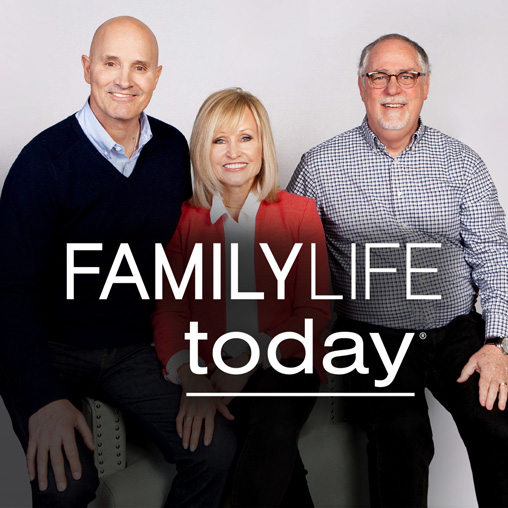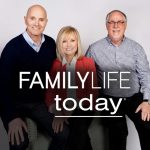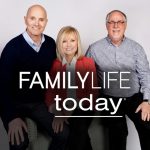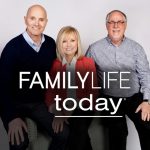
Loss, Lament, and Healing
tells hosts Dave and Ann Wilson the story of how God met her after the tragic loss of her son and the healing his life still brings to others.
Show Notes
About the Host
About the Guest
-
- Download FamilyLife's new app! https://www.familylife.com/app/
- Find resources from this podcast at https://shop.familylife.com/Products.aspx?categoryid=130.
- Check out all that's available on the FamilyLife Podcast Network. https://www.familylife.com/familylife-podcast-network/
-
Dave and Ann Wilson
Dave and Ann Wilson are hosts of FamilyLife Today®, FamilyLife’s nationally-syndicated radio program. Dave and Ann have been married for more than 38 years and have spent the last 33 teaching and mentoring couples and parents across the country. They have been featured speakers at FamilyLife’s Weekend to Remember® marriage getaway since 1993 and have also hosted their own marriage conferences across the country. Cofounders of Kensington Church—a national, multicampus church that hosts more than 14,000 visitors every weekend—the Wilsons are the creative force behind DVD teaching series Rock Your Marriage and The Survival Guide To Parenting, as well as authors of the recently released book Vertical Marriage (Zondervan, 2019). Dave is a graduate of the International School of Theology, where he received a Master of Divinity degree. A Ball State University Hall of Fame quarterback, Dave served the Detroit Lions as chaplain for 33 years. Ann attended the University of Kentucky. She has been active alongside Dave in ministry as a speaker, writer, small-group leader, and mentor to countless wives of professional athletes. The Wilsons live in the Detroit area. They have three grown sons, CJ, Austin, and Cody, three daughters-in-law, and a growing number of grandchildren.
-

Vaneetha Risner
Vaneetha Rendall Risner is a writer and speaker who is passionate about helping people find hope in their suffering. Her memoir, Walking Through Fire: A Memoir of Loss and Redemption as well as her devotional, The Scars That Have Shaped Me: How God Meets Us in Suffering both encourage readers to turn to Christ in their pain. Some of her greatest joys a...more
The death of someone close to us is one of the hardest things we will ever face. Vaneetha Risner tells the story of how God met her after the tragic loss of her son and the healing his life still brings to others.
Loss, Lament, and Healing
Bob: Like any mom, Vaneetha Risner was filled with joy when she gave birth to her son, Paul. Seven weeks later, when, because of a doctor’s mistake, Paul died, Vaneetha had a lot to process, spiritually.
Vaneetha: I was mad at God; I thought, “We did all the right stuff.” That was sort of the theology I had, in some ways is: “You do the right stuff; you pray; you read the Bible; you trust God; then ultimately, everything’s really going to be okay.”
I would just think, “God, you let me trust that Paul would be okay. You let him go through his surgery and live, and then you took him.” I would say I was pretty upset with God.
Bob: This is FamilyLife Today for Tuesday, March 2nd. Our hosts are Dave and Ann Wilson; I'm Bob Lepine. You can find us online at FamilyLifeToday.com. We’ll hear from Vaneetha Risner today about how she wrestled with God over this seemingly senseless tragedy in her own life. Stay with us.
And welcome to FamilyLife Today. Thanks for joining us. I think maybe one of the greatest sources of joy, for any parent, is when you find out that you’re going to have a baby—
Dave: Oh, yes!
Bob: —that first moment. I remember Mary Ann showing up at work in the middle of the day. She walks up to the front of the radio station, where I was working. I thought, “What’s my wife doing up here at the radio station?” And she was walking strong and confident and smiling; and I thought, “I wonder what she’s doing here?” And it was because she had just come from the doctor.
Dave: You had no idea?
Bob: I had no idea; there was nothing. She was beaming! She was thrilled. If the joy of pregnancy and new life is on one end of the scale, then the devastation that comes when you lose a baby—
Ann: When a grandchild is born, that’s another one of the most exciting days, when that pregnancy is announced. I’ll never forget—our first grandchild— with our son and his wife telling us. They bought a little Harley onesie—because Dave owns a Harley—and said, “You’re going to be a Grandpa.” We were ecstatic; but then they lost that baby. And then they lost another baby; and they lost another baby.
Bob: Wow.
Ann: It’s devastating.
Dave: The heartache is really tough.
Bob: Yes; we are talking this week with a guest, who has experienced the pain that we’re talking about, and more pain in life. In fact, her book is all about the trials of life that she’s been through. Vaneetha Risner is joining us, again, on FamilyLife Today. Welcome back.
Vaneetha: Thank you. It’s great to be here.
Bob: We have already shared this week about how you were born with polio; and it might have been diagnosed and treated properly early, but the doctors gave the wrong thing/misdiagnosed. Your immune system was compromised, polio set in; you had dozens of surgeries before you were 13 years old.
We shared that experience; and we want to talk here about what you experienced, as a mom, which included both miscarriages and then the birth of a son that was one of the more painful experiences of your life. Tell us about your pregnancies and your journeys. Share your story with us; can you?
Vaneetha: I got pregnant, after I’d been married a few years, and told everyone!—everybody in my office; everybody that I’d ever met!
Bob: —like right away, as soon as—
Vaneetha: Yes! As soon as—I mean, it was just out of the gate, really excited. Then, I was on a business trip in New York and started bleeding. I came back, just kind of hoping that everything was fine. I was 12 weeks; I went in and found out that I had a miscarriage.
That was the start of this feeling, like, “Life isn’t going to be safe”; because after I had come to Christ, I had probably 15 years of a very easy life. It so far exceeded what I ever thought life would be.
Bob: You’d graduated from the University of Virginia—
Vaneetha: Yes.
Bob: —with a degree in—
Vaneetha: —in business.
Bob: And then gone to Stanford and gotten a Masters/an MBA; right?
Vaneetha: Yes, yes.
Ann: You met your husband there.
Bob: And your career was fast-tracking/your business thing—I mean, yes, life was going pretty good for you.
Vaneetha: It was. You know, for what I expected from life when I was in the hospital, life was perfect!
Bob: Yes.
Vaneetha: I met a classmate in business school; got married; and had a great career after that. I thought, “Life is good and easy.” And then, when I had this miscarriage, there was just this sense that: “Oh, wait! Hard things can still happen.”
Then had a daughter, though, after that, named Katie. I was starting to feel comfortable, but then I had another miscarriage. At that miscarriage, I did the same thing—I told a lot of people—because I thought, “Oh, I had one miscarriage, but I’m not going to have another one.” Having another miscarriage really sort of shook me.
Bob: Yes; your pregnancy and the birth with Katie—everything was fine?
Vaneetha: Everything was fine.
Bob: Okay; alright.
Vaneetha: Then, I was pregnant again; and went in for a 20-week ultrasound, and found out our unborn son had a hypoplastic left heart. A hypoplastic left heart basically means only half of your heart is working. The half that actually does most of the work is not working.
We had a choice of what we could do. I was 20 weeks along, and they said they really wanted me to have an abortion; but they said, “If you don’t do that, these are some options…” One was having a heart transplant at birth; one was having surgery; and one was doing nothing. If you don’t do anything, this condition is fatal; so within two weeks, your child will die.
[We] ended up doing a lot of research and chose to go up to the University of Michigan and have a three-step heart surgery, which a high school friend of mine, who’s a pediatric cardiologist, said, “This is a really good option; medicine has come so far.” We were optimistic; went up to Michigan; had the surgery. Paul was doing great. At first, it was pretty dicey; but we came home, and things were going really well, Bob.
I felt like, “Okay, we’re going to make it through this.” And then, we went in for Paul’s check-up. His regular cardiologist in Raleigh was not there; there was a substitute doctor. He looked at Paul and said, “Oh, my gosh. He’s doing really well!” I mean, he [Paul] was probably 50th-70th/he was at some great percentile in height and weight. He was just thriving.
Bob: And how old is he?
Vaneetha: He is almost seven weeks old.
Bob: Alright.
Vaneetha: The doctor sort of said, “You know what? He doesn’t need all of these medicines!” We had medicine that we were drawing up for him three times a day in little syringes, so we were thrilled. We thought, “Okay, we’re out of the woods.” We took him home, and then, that night, I was going to a baby shower for him. That was the first time anybody had seen him.
I called my friend, who had told us to go up to Michigan. I said, “I just want to tell you the great news! He is off his medicine.” My friend, John, said, “What?! Tell me that again.” I told him; and he said, “He needs that medicine. You need to call them and get him back on it.” It was six o’clock on a Friday night; and I thought, “Oh, no; I don’t even know what he’s not on. I don’t know what to tell them.” He said, “Well, just call.” I did; I left a message and went to the shower. John said I didn’t need to go to the ER; he said, “I think you can wait, but call first thing Monday morning.”
We went to the shower/had a really good weekend with Paul, our son.
Ann: You didn’t hear back from the doctors?
Vaneetha: No; I didn’t hear anything; didn’t know what to do.
Ann: —which is usually good news.
Vaneetha: Yes, exactly! So I just thought, “We’re fine!” And then, Sunday night, at like three in the morning, Paul woke up. I got up to nurse him. He just screamed and went limp in Dave’s arms. That was this moment, where I felt like, “Oh, no; God, you can’t do this! You can’t take Paul.”
We called 911, and an ambulance came. I remember just not knowing what to do. Dave had gone in the ambulance with Paul, and I was so scared. I called John—and this was before cell phones, so I called him in the middle of the night—and his wife told me that he was actually out of town at some friends’ [house]. It was 3 a.m., but I called John at the friends’ house. John answered, and said, “I’m so sorry.” I could hear a note of hopelessness in his voice, so I hung up the phone. I got on my knees, and I begged God; I begged God to save Paul’s life: “Please, please don’t take Paul’s life!” And then, it ended up some friends came over to watch Katie; and I went to the ER.
When I got to the ER, I went to the front desk. I said to them, “So they would have brought my son in by ambulance. I really want to see him!” The woman said, “I’m sorry; your son is dead.” And that moment is this moment frozen in time for me. I couldn’t even process it; it wasn’t something I had been expecting. I went in and just saw Paul’s little body for the last time. Dave was holding him. I could not believe that had happened to us. Paul had been doing so well, and this was a doctor’s mistake. I couldn’t really reconcile that, in a lot of ways, with “How does God care and look after his children, who are praying?”
Dave: And it’s the second doctor’s mistake in your life.
Vaneetha: Yes.
Bob: The first one was when the doctor mis-prescribed and that led to your polio.
Vaneetha: Yes.
Bob: Now, here a doctor says, “You don’t need this medication,” and 72 hours later, your son is dead.
Vaneetha: Yes.
Ann: Were you angry with God?
Vaneetha: Not at first. We had the funeral; and I got up and said, “God never makes a mistake.” And then, three weeks later, I wanted to pull every word back; I thought, “We did all the right stuff.” That was sort of the theology I had, in some ways is: “You do the right stuff; you pray; you read the Bible; you trust God; then ultimately, everything’s really going to be okay.”
Looking at all of the clothes from Paul’s baby shower—I remember looking at those so many times—because I didn’t know what to do with them. Every time I saw them, I would just think, “God, you let me trust that Paul would be okay. You let him go through his surgery and live, and then you took him.” I would say I was pretty upset with God.
Dave: So you’re walking through a dark night of the soul/a valley.
Vaneetha: Yes.
Dave: How long? I mean, what brought you out and when?
Vaneetha: It’s interesting. I can’t even remember the days, but it felt like months. I need to go back and see exactly how long it was, but it was months of feeling dark. Then, one day in the car, I just cried out to God. I said, “I can’t do this! I can’t be this far away from You! I need You to fill me with Yourself. I need You to do something.”
And then, I put in a worship tape—actually, it was a cassette tape—and all of a sudden, God’s presence filled my car. I didn’t see God, but I sensed God with this joy that I couldn’t contain. I remember being so ecstatically happy, thinking, “If this is what life with Christ is, I’ll take it over anything!”
Ann: So you felt His presence and His joy—
Vaneetha: Yes!
Ann: —immediately in your car?
Vaneetha: Yes! And I had been so depressed, and so angry, and so hurt; yet, in my car that day, God was there. God said, “You know what? No matter what you go through, you’ll have Me.” The need that I felt—that presence that God gave me—radically changed me. From that day on, I thought, “Okay, God, if I know that You are here, and You can do this, then I’ll walk through whatever You call me to.”
Bob: Let me go back to the valley—
Vaneetha: Yes.
Bob: —the desert that you were in—were you trying to draw near to God, and it was silent?—or had you given up on trying?
Vaneetha: Oh, I’d given up on trying; I hadn’t even started trying. I was just thinking, “You know, your mom says, ‘If you can’t say anything good, don’t say anything at all,’”—that was kind of where I was. I had not—I was so frustrated with God and with sort of the theology that I had assumed was true—I was questioning everything and didn’t want to talk to God.
Bob: Was there anybody from your church? Was Dave/anybody know this was where you were and trying to bring you back closer to the Lord?
Vaneetha: No, because I am a superficial pleaser. [Laughter] At least, I was; I was all about making it look pretty.
Dave: You were hiding it.
Vaneetha: I was hiding it.
Dave: Going to church?
Vaneetha: Yes! Going to church. Not necessarily telling people that God was close to me—I wasn’t quite that bad—but I was not willing to let people in.
Bob: If somebody came up and said, “How are you doing? I’ve been praying for you,” you just said, “Thank you; that means a lot to me”?
Vaneetha: Exactly! You were probably in my church! You seem to have that down pretty well.
Bob: I know how to—
Vaneetha: Yes; “Thank you; I appreciate that!”
I did not share it with anybody, which was what made it even darker. I think people, who are willing to just put it out there—and say, “I’m angry, and I’m struggling,”—even that can draw them to God; but I was just silent.
Ann: We have a close friend that just lost her 34-year-old daughter. Everything you’re describing is what she’s describing: “I feel nothing. I’m numb; I’m angry.” I’m encouraged that she has, at least, said that; but she has said, “I don’t know how to find God again, because I don’t know if I can trust Him.”
That sounds exactly like what you were feeling. What would you say to those people now?
Vaneetha: That’s kind of the question; I mean, Jerry Bridges says, you know, “Can you really trust God when adversity comes and fills your life with pain?” That was my question. I would say, “Yes, you can”; because God/two things God taught me, really, throughout my life is: “God’s going to be with you through it,”—that’s one reason you can trust God—“and God’s going to use it; God does have a purpose,”—we may not ever see it this side of heaven—but “Knowing that God will walk with you and God is going to use it really does change things.”
For me, it was really seeing the character of God through the Bible that really cemented my trust. It was soon after that that I started just poring over the Bible, like, “I need to know You in a different way.” Because, when I came to know Christ when I was 16, I knew Him as this God who had this great purpose for my life, and I really liked the Bible—it was a good thing to read—but through every suffering in my life, the Bible has become more and more alive to me.
I would say, after Paul’s death, I learned what lament was. I didn’t know that that was even a concept in the Bible. I had heard about it; but when you read the Psalms, you see that a lot of people—the psalmists, Asaph/David—they ask those hard questions, like: “Where are You, God?” and “Can I trust You?” And God would answer, really, with Himself. I realized that’s how God answered me; I didn’t have a reason why Paul died—I don’t know—but God answered me with Himself.
Dave: It’s interesting—when you even talk about being in the car, and the power of the moment of ascribing worth to God—I’m guessing you weren’t singing, but you were listening. Or maybe you were singing?
Vaneetha: Well, I started off by listening; and by the end, I was singing. And I don’t sing well; let’s just put it out there. [Laughter]
Dave: But you were in your car by yourself.
Vaneetha: Exactly! So I could just belt it out, and nobody was going to say anything. It was incredible! It was, really, in this praising God—for me—I think music can sometimes unlock things in us.
Dave: Yes.
Vaneetha: It really was just hearing the words of this song, and someone ascribing to God glory, just sort of washed over me. Just as I started to sing it, there was just this sense that the Holy Spirit said, “This is what life is really about”; it is about worshiping God and forgetting everything else.
My sister and I were talking about suffering the other day. She said, “Suffering is this stripping away of everything but Jesus.” I really felt like that’s what had happened. God had stripped away everything at that moment, I thought, from me; but Jesus. And Jesus showed He was so much more than I thought.
Dave: You know, it’s interesting—often, when we’re in suffering, or in that valley, or that desert—the last thing we’re ever going to do—I mean: “I’m not going to go to church,” “I’m not going to pick up my Bible,” “I’m definitely not going to put a worship cassette or CD on,”—you know—“I’m just not going to do it!”
You know, when Ann’s sister died of cancer at 45, when we would go to church and worship would be played, we would weep. I would look over, and Ann would be sobbing.
Ann: There’s something about music that connects to your soul. I could hide everywhere else; but when I sang, it came from the depths of me. I would just weep uncontrollably, to the point where, “This is embarrassing,” because I can’t contain the pure depth of pain I was feeling. But there’s something about worship that draws it out; doesn’t it?
Vaneetha: Yes!
Dave: And it’s healing, in a sense.
Here’s my question, though: “When you got out of that car, and you walked back into life, was it sustainable?”
Ann: —“or was it momentary?”
Dave: Yes; and was it just, “I sang a song, and everything was good after that,” or was there still a struggle?
Vaneetha: It wasn’t like life was radically and totally different, but there was a grounded-ness in Christ that was different. I would say I still lamented; it was still hard; I still pored over the Psalms and asked God the hard questions, but I was with God. I was talking to God; whereas, I would say—for the months before that—I was not talking to God. I think that’s the most important, critical piece. I started talking to God; and the more you talk to God, the more He changes you.
Ann: And then there was a song written.
Vaneetha: Yes.
Ann: Tell us about that.
Vaneetha: One of my really good friends is named Christa Wells. She had come over to our house, actually, after Paul had died. We talked to her a lot about what God had done in that. She wrote a song a few months later called Held. The first verse is all about Paul, and the other two are about other friends she had, [who] had sustained serious losses.
The first verse starts with, “Two months is too little, but they let him go; they had no sudden healing.” It was this amazing, healing song that she sang at our church. Then, she asked me, months later, “I am thinking about asking somebody to record it,” or “Somebody’s really interested in it,” “What do you think about that?” I thought, “That sounds great.” It ended up being Natalie Grant; the song is Held. I was amazed at how healing that song has been to so many people, because it has touched them.
You know, the chorus is: “This is what it means to be held; how it feels when the sacred is torn from your life and you survive.” I feel like that was our story—was the sacred was torn from our life, and we survived—and God held us in it.
[Held Playing in the Background]
Dave: I think the lyrics are so beautiful, because I think it’s the question in all of our hearts: “Am I held?”—
Vaneetha: Yes.
Dave: —especially in the storm/in the valley—“is there a God who has got me?” You know, I think that’s why so many people connected with that song; because it says, “Yes, you are. Even when it doesn’t feel like it—even when you can’t see it or, maybe, feel it—there are strong hands that have/are holding you.”
Vaneetha: Yes.
Dave: Yes.
Bob: We’ve got to wrap things up here today, but we’re going to take a little extra time; and if listeners want to join us, online, at FamilyLifeToday.com, we want to talk through the whole issue of lament, and how we think about that, and how we should process it; but also, the question of the sovereignty of God in the face of suffering and evil. These are questions you address in your book, Walking Through Fire.
We want to have a little more conversation; so again, listeners can go online to FamilyLifeToday.com and download the podcast. It’s about seven to eight minutes of additional conversation with Vaneetha about these questions. That’s available, online, at FamilyLifeToday.com. We’re making your book, Walking Through Fire, available to FamilyLife Today listeners this week for anyone, who can help with a donation to help advance the ministry of FamilyLife Today. We’d love to send you Vaneetha’s book as our thank-you gift.
Let me just say a word: “When you donate to FamilyLife Today, what you’re really investing in is providing practical biblical help and hope for marriages and families—hundreds of thousands of marriages and families—every day: people who are connecting with us, here, at FamilyLife® on our website, through this radio program or podcasts; those of you who connect with us at events or use our resources.
FamilyLife Today listeners, who support this ministry, you make all of that possible any time you make a donation. We’re so grateful for our regular Legacy Partners, those of you who donate each month to support this ministry. And those of you who are able, from time to time, to help with a donation, we’re grateful for you as well.
You can make a donation today. Be sure to ask for your copy of Vaneetha Risner’s book, Walking Through Fire. We’ll send it to you as a way of saying, “Thank you for your support.” You can donate, online, at FamilyLifeToday.com; or you can call 1-800-FL-TODAY to get your copy. Again, the title of the book is Walking Through Fire: A Memoir of Loss and Redemption by Vaneetha Risner. You can request your copy when you donate to FamilyLife Today, online, at FamilyLifeToday.com; or by calling 1-800-358-6329; 1-800-FL-TODAY. Make your donation over the phone, and be sure to ask for your copy of Vaneetha’s book when you get in touch with us.
And we hope you can join us, again, tomorrow when Vaneetha will share with us about another turn in your life. Again, this just kind of feels like it all gets piled on; but when you learned that your husband was being unfaithful to you—we’ll talk about that tomorrow. I hope you can be with us for that.
I want to thank our engineer today, Keith Lynch. We got some help today from Bruce Goff; and our entire broadcast production team, of course, pitched in on this program. On behalf of our hosts, Dave and Ann Wilson, I’m Bob Lepine. We will see you back next time for another edition of FamilyLife Today.
FamilyLife Today is a production of FamilyLife of Little Rock, Arkansas; a Cru® Ministry. Help for today. Hope for tomorrow.
We are so happy to provide these transcripts to you. However, there is a cost to produce them for our website. If you’ve benefited from the broadcast transcripts, would you consider donating today to help defray the costs?
Copyright © 2021 FamilyLife. All rights reserved.





